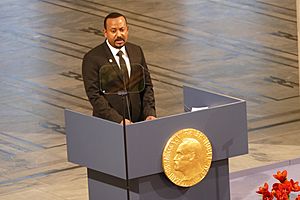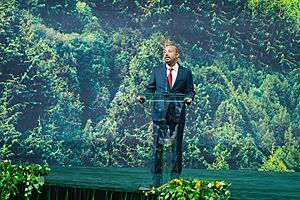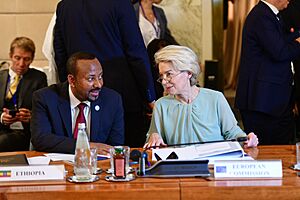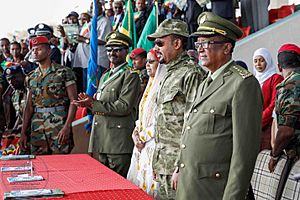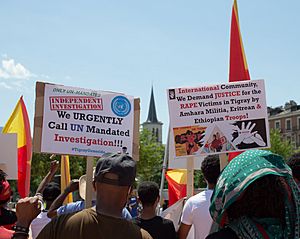Abiy Ahmed facts for kids
Quick facts for kids
Abiy Ahmed
|
|
|---|---|
|
አብይ አሕመድ
|
|

Abiy in 2025
|
|
| Prime Minister of Ethiopia | |
| Assumed office 2 April 2018 |
|
| President | |
| Deputy |
|
| Preceded by | Hailemariam Desalegn |
| 1st President of the Prosperity Party | |
| Assumed office 1 December 2019 |
|
| Deputy |
|
| Preceded by | Party established |
| 3rd Chairman of the Ethiopian Peoples' Revolutionary Democratic Front | |
| In office 27 March 2018 – 1 December 2019 |
|
| Deputy | Demeke Mekonnen |
| Preceded by | Hailemariam Desalegn |
| Succeeded by | Party abolished |
| Leader of the Oromo Democratic Party | |
| In office 22 February 2018 – 1 December 2019 |
|
| Deputy | Lemma Megersa |
| Preceded by | Lemma Megersa |
| Succeeded by | Post abolished |
| Minister of Science and Technology | |
| In office 6 October 2015 – 1 November 2016 |
|
| Prime Minister | Hailemariam Desalegn |
| Preceded by | Demitu Hambisa |
| Succeeded by | Getahun Mekuria |
| Director General of the Information Network Security Agency | |
|
Acting
|
|
| In office 2008–2015 |
|
| Preceded by | Teklebirhan Woldearegay |
| Succeeded by | Temesgen Tiruneh |
| Personal details | |
| Born |
Abiy Ahmed Ali
15 August 1976 Beshasha, Kaffa Province, Ethiopia |
| Political party | Prosperity Party |
| Other political affiliations |
|
| Spouse | Zinash Tayachew |
| Children | 4 |
| Education | Microlink Information Technology College (BA) University of Greenwich (MA) Leadstar College of Management (MBA) Addis Ababa University (PhD) |
| Awards | Nobel Peace Prize (2019) |
| Military service | |
| Allegiance | Ethiopia |
| Branch/service | Ethiopian Army |
| Years of service | 1991–2010 |
| Rank | |
| Unit | Army Signals Corps |
| Commands | Information Network Security Agency |
| Battles/wars |
|
Abiy Ahmed Ali (Oromo: Abiyi Ahmed Alii; Amharic: ዐብይ አሕመድ ዐሊ; born 15 August 1976) is a politician who serves as the current Prime Minister of Ethiopia. He has held this important role since 2018. He is also the leader of the Prosperity Party, which he has led since 2019.
Abiy Ahmed became well-known through his work at the Information Network Security Agency (INSA). This agency was created in 2006. In 2019, he received the Nobel Peace Prize. This award was given to him for his efforts to bring peace and cooperation between countries. It especially recognized his big step to solve the border conflict with neighboring Eritrea.
Before leading the Prosperity Party, Abiy was the third chairman of the Ethiopian People's Revolutionary Democratic Front (EPRDF). This group governed Ethiopia for 28 years. He was the first person of Oromo descent to hold that position. Abiy is a member of the Ethiopian parliament. He was part of the Oromo Democratic Party (ODP) until he formed his own party, the Prosperity Party, in 2019.
In June 2020, Abiy and the National Election Board of Ethiopia (NEBE) decided to delay parliamentary elections. This was due to the COVID-19 pandemic. Some people criticized this decision, but an election was held in 2021. The African Union said the election was better than the one in 2015. They encouraged the government to keep working towards democracy.
After some disagreements in 2020, a conflict known as the Tigray War began. This war involved the Ethiopian army and the Eritrean army fighting against forces loyal to the TPLF. After a peace agreement ended the Tigray War, Abiy started to bring all regional armies into the national army. Some groups, like Fano, did not agree to this. This led to another conflict called the War in Amhara.
Since 2019, Ethiopia has faced some challenges under Abiy's leadership. There have been concerns about human rights, media freedom, and internet access. There have also been conflicts in different parts of Ethiopia. Many journalists and activists were arrested for breaking "constitutional laws." Abiy is also believed to lead a group called Koree Nageenyaa. This group is said to be involved in arrests and killings in the Oromia Region.
Contents
Abiy Ahmed's Life Story
Early Life and Family
Abiy Ahmed was born on 15 August 1976 in a small town called Beshasha, Ethiopia. His father, Ahmed Ali, was a Muslim Oromo farmer. His mother, Tezeta Wolde, was a Christian. She spoke both Amharic and Oromo. Abiy was the youngest of his mother's six children and his father's thirteenth child.
His childhood name was Abiyot, which means "Revolution." This name was sometimes given to children after the Ethiopian Revolution in the 1970s. Abiy went to primary school in Beshasha and later to secondary schools in Agaro. He always loved learning and encouraged others to do the same.
Abiy married Zinash Tayachew, who is from Gondar. They met while serving in the Ethiopian National Defense Force. They have three daughters and one adopted son. Abiy speaks Oromo, Amharic, Tigrinya, and English. He enjoys staying fit and often goes to the gym.
Faith and Education
Abiy is a Pentecostal Christian. He grew up in a family with different religions. He and his family attend church regularly. He sometimes preaches and teaches at the Ethiopian Full Gospel Believers' Church. His wife, Zinash Tayachew, is also a Christian and a gospel singer.
While in the army, Abiy earned his first degree in computer engineering. This was from Microlink Information Technology College in Addis Ababa in 2009. He also has a Master of Arts in transformational leadership from Greenwich University (2011). He earned a Master of Business Administration from Leadstar College of Management and Leadership (2013).
Abiy completed his PhD in 2017 from Addis Ababa University. His PhD work focused on how social connections can help solve conflicts between religions in the Jimma Zone. He also wrote a research article about ways to reduce conflict in the Horn of Africa.
From Soldier to Politician
Military and Intelligence Work
When he was 14, in 1991, Abiy joined the fight against the government of Mengistu Haile Mariam. He was a child soldier with the Oromo People's Democratic Organization (OPDO). This group was part of a larger army that helped overthrow the government. He quickly learned the Tigrinya language, which helped him in his military career.
After the government fell, he received formal military training. In 1993, he became a soldier in the Ethiopian National Defense Force. He worked mainly in intelligence and communications. In 1995, he was part of the United Nations Assistance Mission for Rwanda (UNAMIR) in Kigali. During the Eritrean–Ethiopian War (1998–2000), he led a team to find enemy positions.
Later, Abiy returned to his hometown of Beshasha. There, he helped calm serious religious clashes between Muslims and Christians. He worked to bring peace and reconciliation. He continued these efforts as a politician, helping to create the "Religious Forum for Peace."
Role in INSA
In 2006, Abiy helped start the Information Network Security Agency (INSA). He held various roles there. INSA was created with help from the United States. It was first meant to gather information from neighboring Somalia. Over time, it also started to monitor things inside Ethiopia. Abiy became very influential through his work at INSA. He was acting director for two years. He also served on the boards of other government agencies. In 2010, he left the military as a Lieutenant colonel to become a politician.
Becoming Prime Minister
Member of Parliament
Abiy began his political journey with the Oromo Democratic Party (ODP). This party was powerful in the Oromia Region. In 2010, Abiy was elected to the House of Peoples' Representatives, Ethiopia's parliament. During his time in parliament, he continued his efforts to resolve religious conflicts in the Jimma Zone. He helped create the "Religious Forum for Peace" to promote understanding between Muslims and Christians.
In 2014, Abiy became the director-general of the Science and Technology Information Center (STIC). The next year, he was re-elected to parliament.
Rise to Power
From 2015, Abiy became a key figure in fighting against illegal land grabbing in the Oromia Region. This issue brought him into the public eye and helped him advance in politics.
In October 2015, Abiy became the Minister of Science and Technology. He held this post for a year. From October 2016, he served as Deputy President of the Oromia Region. He also led the Oromia Urban Development and Planning Office. In this role, he worked on economic development, land reform, and youth employment. He also helped over a million Oromo people who were displaced from the Somali Region in 2017.
As head of the ODP Secretariat from October 2017, Abiy helped form a new alliance. This alliance was between the Oromo and Amhara groups, who make up two-thirds of Ethiopia's population.
By early 2018, Abiy was very popular among the Oromo community and other Ethiopians. Young people in Oromia wanted quick changes for freedom. Abiy believed in open and respectful discussions to achieve political progress.
Becoming EPRDF Leader
After three years of protests, Prime Minister Hailemariam Desalegn resigned in February 2018. This led to a competition to choose the new leader of the EPRDF. The EPRDF leader was expected to become the next Prime Minister.
Abiy Ahmed was a strong candidate. On 22 February 2018, his party, ODP, chose him as their chairman. This was a strategic move to help him become Prime Minister.
On 1 March 2018, the EPRDF executive committee met to elect a new leader. Abiy Ahmed won the election on 27 March 2018. He received 108 votes. On 2 April 2018, Abiy Ahmed was officially sworn in as the Prime Minister of Ethiopia.
Prime Minister of Ethiopia
When Abiy became Prime Minister on 2 April 2018, he promised many changes. He spoke about political reforms and bringing unity to Ethiopia. He also said he would work with Eritrea to solve their border conflict. His speech was met with great hope and support from the public.
Changes in Ethiopia
Since becoming Prime Minister, Abiy's government has released many political prisoners. In May 2018, over 7,600 prisoners were pardoned in the Oromo region. Important opposition leaders were also released and had charges against them dropped. Abiy even met with some of these former prisoners.
His government also announced plans to change the country's anti-terrorism law. This law was seen by many as a way to stop political opposition. On 1 June 2018, Abiy said the state of emergency would end early because the situation in the country had improved. Parliament approved this on 4 June 2018.
Abiy explained that releasing prisoners was important for peace. He said that policies that allowed unfair arrests and torture were wrong. These changes showed some disagreements within the ruling party. Some members felt that Abiy was moving too quickly.
Economic Changes
In June 2018, the government announced big plans to sell parts of state-owned businesses. They also planned to open up important economic areas to private companies. This was a major change for Ethiopia's economy.
Industries like telecommunications, aviation, electricity, and logistics were opened to private competition. Shares in companies like Ethiopian Airlines were offered to investors. The government would still own most of these companies. Other businesses, like railway operators and hotels, might be fully privatized.
These changes were meant to improve Ethiopia's economy. They aimed to increase foreign money coming into the country and reduce its debt. Abiy also announced plans to create an Ethiopian stock exchange.
Working with Other Countries
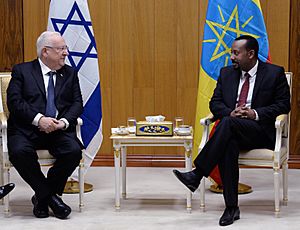
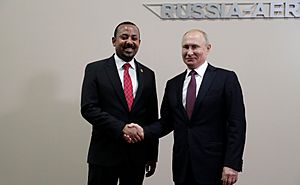
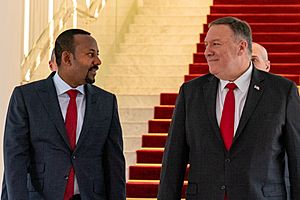
Abiy has traveled to many countries to strengthen relationships. In May 2018, he visited Saudi Arabia and helped release Ethiopian prisoners. In June 2018, he met with the President of Egypt and helped arrange peace talks between leaders in South Sudan.
In December 2022, he attended a summit in Washington, D.C., and met with US President Joe Biden. He also met with French President Emmanuel Macron in February 2023 and Italian Prime Minister Giorgia Meloni in April 2023. In May 2023, German Chancellor Olaf Scholz met with Abiy to improve relations between Germany and Ethiopia. In July 2023, Abiy met with Russian President Vladimir Putin.
Port Agreements
Since becoming Prime Minister, Abiy has worked to give landlocked Ethiopia better access to ports. Ethiopia now has a share in Berbera Port in Somaliland and the Port of Djibouti. They also signed an agreement with Sudan for a share in Port Sudan. These agreements help Ethiopia use different ports for trade.
An agreement with Kenya also plans for an Ethiopian logistics center at Lamu Port. If relations with Eritrea improve, Ethiopia could also use the ports of Massawa and Asseb again. This would reduce Ethiopia's reliance on Djibouti's port.
Peace with Eritrea
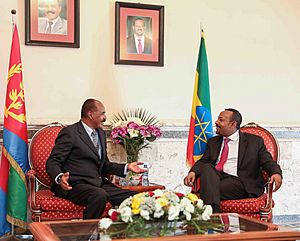
Abiy said he wanted to end the conflict with Eritrea. In June 2018, Ethiopia agreed to hand over the disputed town of Badme to Eritrea. This followed a peace agreement from 2000. This decision aimed to end the long-standing tension between the two countries.
On 20 June 2018, Eritrea's President Isaias Afwerki accepted Abiy's peace offer. On 26 June 2018, Eritrea's Foreign Minister visited Addis Ababa. This was the first high-level visit in over two decades.
On 8 July 2018, Abiy became the first Ethiopian leader in over 20 years to meet with an Eritrean leader. They signed a "Joint Declaration of Peace and Friendship." This agreement declared an end to tensions. They agreed to restart diplomatic relations, reopen communication, and allow Ethiopia to use Eritrean ports. Abiy received the Nobel Peace Prize in 2019 for his efforts to end the war.
However, some people say that the agreement has not been fully put into practice. They feel that not much has changed between the two nations. Some people in the Eritrean community also expressed disappointment that the Nobel Peace Prize focused on this agreement when so little had changed.
In October 2023, Abiy said that Eritrea separating from Ethiopia in 1993 was a mistake. He believes Ethiopia needs direct access to the Red Sea for its growing population.
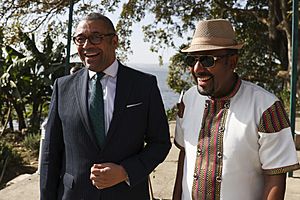
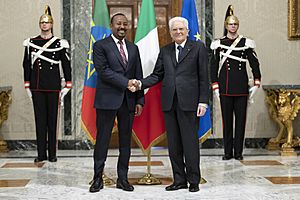
Relations with Egypt
Ethiopia and Egypt have had disagreements over the Grand Ethiopian Renaissance Dam. This dam is very important to both countries. Abiy has stated that Ethiopia will continue building the dam.
Promoting Religious Harmony
Ethiopia has many different religious groups, mainly Christians and Muslims. There have been conflicts between and within these groups. In 2018, Abiy received a special "peace and reconciliation" award from the Ethiopian Church. This was for his work in bringing different groups within the church together.
Security Reforms
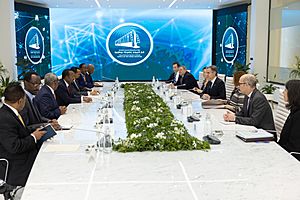
In June 2018, Abiy announced plans to reform the military. He wanted to make it more effective and professional. He also called for the return of the Ethiopian Navy, which was dissolved in 1996. This idea was popular with many Ethiopians.
On 7 June 2018, Abiy changed many top security officials. He replaced the Chief of Staff of the Ethiopian National Defense Force and the director of the National Intelligence and Security Service.
Grenade Attack
On 23 June 2018, a large peaceful rally was held in Addis Ababa to support Abiy. After he finished speaking, a grenade was thrown near where he was sitting. Two people died, and over 165 were injured. Abiy was unharmed. He described it as an "unsuccessful attempt by forces who do not want to see Ethiopia united." He visited the victims in the hospital.
Cabinet Changes
In October 2018, Abiy suggested reducing the number of government ministries from 28 to 20. He also proposed that half of the cabinet positions be held by women. This was a first for Ethiopia. The new cabinet included the first female president, Sahle-Work Zewde, and the first female Minister of Defense, Aisha Mohammed Musa.
Internet Access

Organizations like Human Rights Watch have noted that internet shutdowns have become more common in Ethiopia under Abiy's leadership. These shutdowns often happen during times of unrest.
Political Party Changes
On 21 November 2019, the EPRDF ruling coalition formed a new party called the Prosperity Party. This new party was created by combining three of the four main parties from the EPRDF and five other smaller parties. Abiy believes the Prosperity Party is committed to strengthening a fair federal system that respects all Ethiopians.
Challenges and Conflicts
When Abiy came to power in 2018, he brought many reforms. However, these changes also led to some disagreements and conflicts.
Amhara Region Conflict
On 22 June 2019, there was an attempt to overthrow the government in the Amhara Region. The President of the Amhara Region was killed. The Chief of the General Staff of the Ethiopian National Defense Force was also assassinated. The Prime Minister's Office accused a general named Asaminew Tsige of leading the plot. Tsige was later killed by police.
Metekel Conflict
Starting in June 2019, there were conflicts in the Metekel Zone. These involved militias from the Gumuz ethnic group. Amnesty International reported that attacks in December 2020 were by Gumuz against people from other ethnic groups.
October 2019 Clashes
In October 2019, there were clashes after an activist named Jawar Mohammed claimed police tried to arrest him. This happened after Abiy had spoken in parliament about "media owners who don't have Ethiopian passports" causing problems.
Hachalu Hundessa Riots
The murder of Oromo singer Hachalu Hundessa in June 2020 led to serious riots across the Oromia Region and Addis Ababa. These riots resulted in many deaths.
Tigray War
In November 2020, an armed conflict began in the Tigray region. This happened after TPLF forces attacked military headquarters. The Ethiopian army, supported by the Eritrean army and other regional forces, fought against the TPLF. The conflict escalated after the TPLF held its own regional elections, which the central government did not recognize.
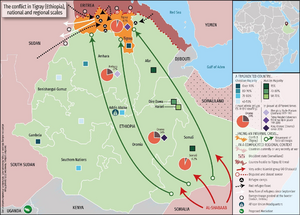
The Ethiopian government announced on 28 November 2020 that they had captured Mekelle, the capital of Tigray. However, reports suggested that fighting continued. The United Nations said that about 2.3 million children were cut off from aid. They were frustrated by the strict control of access to the Tigray region.
There were reports of looting and changes in administration in parts of Tigray. Some international media and human rights groups have raised concerns about the conflict. The US Secretary of State, Antony Blinken, spoke about "credible reports of human rights abuses." Researchers from Ghent University in Belgium estimated that many people died due to the war and famine by late 2022.
War in Amhara
In April 2023, disagreements arose between the Ethiopian federal government and Amhara regional forces, especially the Fano militia. This happened when the national army tried to disarm regional forces. Protests erupted in several cities.
Further clashes occurred in August 2023. The Amhara Regional Governor asked for help from the national army. This led to a six-month state of emergency. The Ethiopian Human Rights Commission reported that civilians were killed and injured in various towns. The conflict also spread to the Oromia Region.
Political Views
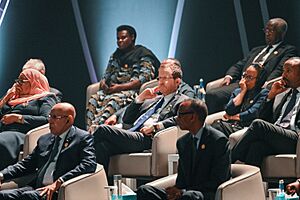

Abiy has been described in different ways by experts. Some call him a "liberal populist," meaning he supports both individual freedoms and popular ideas. Others see him as a "liberal democrat," focusing on democratic principles. However, some also note that he has used language that can be seen as vague or even misleading at times.
Awards and Recognition
| # | Award | Awarding institution | Date |
|---|---|---|---|
| 1 | Most Excellent Order of the Pearl of Africa: Grand Master | Uganda | 9 June 2018 |
| 2 | Order of the Zayed Medal | UAE Crown Prince | 24 July 2018 |
| 3 | High Rank Peace Award | Ethiopian Orthodox Church | 9 September 2018 |
| 4 | Order of King Abdulaziz | Kingdom of Saudi Arabia | 16 September 2018 |
| 5 | Nominee for Tipperary International Peace Award | Tipperary Peace Convention | November 2018 |
| 6 | 100 Most Influential Africans of 2018 | New African magazine | 1 December 2018 |
| 7 | African of the year | The African leadership magazine | 15 December 2018 |
| 8 | The 5th Africa Humanitarian and Peacemakers Award (AHPA) | African Artists for Peace Initiative | 2018 |
| 9 | 100 Most Influential People 2018 | Time magazine | 1 January 2019 |
| 10 | 100 Global Thinkers of 2019 | Foreign Policy magazine | 1 January 2019 |
| 11 | Personality of the Year | AfricaNews.com | 1 January 2019 |
| 12 | African Excellence Award for Gender | African Union | 11 February 2019 |
| 13 | Humanitarian and Peace Maker Award | African Artists Peace Initiative | 9 March 2019 |
| 14 | Laureate of the 2019 edition of the Félix Houphouët-Boigny – UNESCO Peace Prize | UNESCO | 2 May 2019 |
| 15 | Peace Award for Contribution of Unity to Ethiopian Muslims | Ethiopian Muslim Community | 25 May 2019 |
| 16 | Chatham House Prize 2019 Nominee | Chatham House – The Royal Institute of International Affairs | July 2019 |
| 17 | World Tourism Award 2019 | World Tourism Forum | August 2019 |
| 18 | Hessian Peace Prize | State of Hessen | August 2019 |
| 19 | African Association of Political Consultants Award | APCAfrica | September 2019 |
| 20 | Nobel Peace Prize | Nobel Foundation | 11 October 2019 |
| 21 | GIFA Laureate 2022 - Global Islamic Finance Award | Global Islamic Finance Awards | 14 September 2022 |
| 22 | Outstanding African Leadership Award Award for Green Legacy Initiative | American Academy of Achievement and Global Hope Coalition | 13 December 2022 |
| 23 | FAO Agricola Medal | UN's Food and Agriculture Organization | 28 January 2024 |
See also
 In Spanish: Abiy Ahmed Ali para niños
In Spanish: Abiy Ahmed Ali para niños
 | William M. Jackson |
 | Juan E. Gilbert |
 | Neil deGrasse Tyson |


